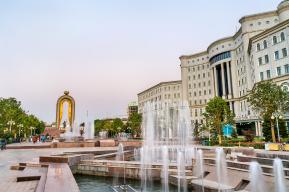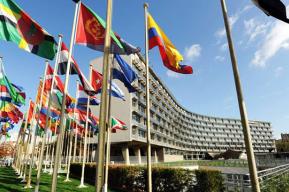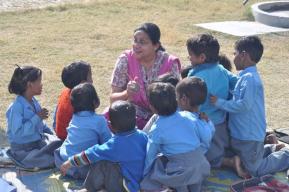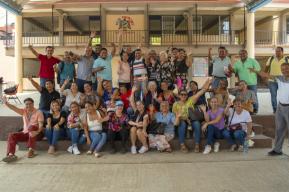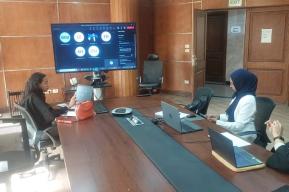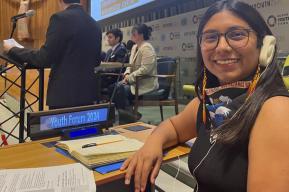News
Doha Climate Change Conference
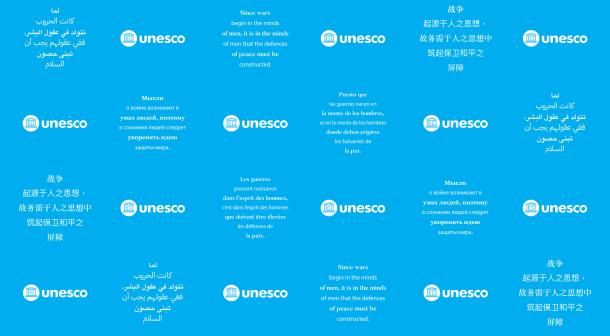
Over 20,000 delegates, key members from governments, UN Organizations and civil society are expected to attend the United Nations Climate Change Conference in Doha on 26 November – 7 December 2012. It includes the Conference of the Parties of the United Nations Framework Convention on Climate Change (COP 18) and the Meeting of the Parties to the Kyoto Protocal (MOP 8). UNESCO and its Intergovernmental Oceanographic Commission both participate in the Conference of the Parties as observers. They provide input upon request by Member States.
This annual event it is also a technical conference and a climate change expert meeting with a range of side events and exhibits. Side Events are a vital component of the sessions, as they provide opportunities for information dissemination, capacity building and policy discussions. UNESCO will be participating in a wide range of events relating to its domains of action.
UNESCO Exhibit Booth
COP18 venue, booth n°11
The exhibit will present the UNESCO Climate Change Initiative and UNESCO's actions on climate change mitigation, adaptation, climate knowledge, research and monitoring, education and public awareness. Members of UNESCO’s team will welcome visitors at the booth.
UNESCO will be participating in the following events:
Tuesday, 27 Nov 2012
Climate change and education - making the future work for you
Side event, 18:30—20:00, Room 1
Rio+20 reaffirmed that we need to embark on a more sustainable development path. To achieve this we need to change how we think and act, develop and implement educational and training programmes, and have our youth engage in these programs in order to secure green jobs and a green economy.
Thursday, 29 Nov 2012
Integrated Spatial Data for Climate Adaptation Planning Integrated Spatial Data for Adaptation Planning
Side event, 13:15-14:45
This side event will launch an initiative to establish a common spatial data framework for vulnerability analysis and adaptation planning, linking a wide range of relevant data using Geographic Information Systems (GIS). The event will also showcase existing uses of spatial data for adaptation.
The tourism sector response to climate change: mitigation and adaptation initiatives and strategies
Side event, 18:30—20:00 Room 1
Tourism represents over 5% of the global GDP and one in every 12 jobs worldwide. It will continue to grow and needs to adopt measures to reduce its contribution to climate change. Participants will present initiatives and future strategies to mitigate tourism emissions and adapt to climate change.
Addressing Climate Change through South-South Sci-tech Cooperation
Side event, 20:15—21:45 Room 7
The development and dissemination of environment friendly technologies suited to the national conditions of developing countries is important in enhancing their capability to address climate change.
Friday, 30 Nov 2012
Global Framework for Climate Services (GFCS)
Side event, 18:30—20:00 Room 2
The Global Framework for Climate Services (GFCS), a UN system-wide initiative, will amplify the benefits from global to national levels of efforts to adapt to climate variability and change for improved health, water management, disaster risk reduction, agriculture and food security from 2013.
Sunday, 2 Dec 2012
Forest Day
Hosted by the Collaborative Partnerships on Forests (which includes CBD, FAO, IUCN, UNDP, UNEP, GEF, WB and more), Forest Day is a platform for anyone interested in forests and climate change to gather and to ensure that forests are high on the agenda of global and national climate strategies, and that those strategies are informed by the most up-to-date knowledge and experience.
Meeting with the Collaborative Adaptation Research Initiative in Africa and Asia (CARIAA)
This day-long parallel event will provide an introduction to the program and its approach, interactive discussions with experts on research questions and lessons relevant to the programme. CARIAA is a new seven-year research program funded by of the UK’s Department for International Development (DFID) and Canada’s International Development Research Centre (IDRC). CARIAA will support three research consortia. Each consortium undertake a research project aimed at increasing the resilience of vulnerable populations and their livelihoods in one of the following climate change “hot spots” in Africa and Asia: densely populated river basins affected by glacial melt, low-lying coastal deltas, and semi-arid regions.
Monday, 3 Dec 2012
Agriculture, Landscapes and Livelihoods: Solutions for People in Drylands and Beyond
This event provides a unique opportunity for the natural resource and agriculture community to share solutions for climate change adaptation and mitigation in agricultural landscapes. It will provide a venue to engage with key stakeholders and decision makers, and develop solutions that can feed into 2013 United Nations Framework Convention on Climate Change (UNFCCC) discussions.
High level launch event of the Inter-agency partnership on Article 6
13:15-14:45 Room X
The interagency partnership (UNESCO, UNICEF, UNEP, UNFCCC, UNITAR and UNDP) represents a support structure for the implementation of the Doha work programme on Article 6 of the United Nations Framework Convention on Climate Change, which focuses on education, training and public awareness.
Tuesday, 4 Dec 2012
The UN System Delivering as One on Climate Change: Sustainable Solutions for Climate Action
High-level side event of the United Nations System Chief Executives Board for Coordination (CEB), 13:15 – 14:45
The event will foster a dialogue between Parties to the Convention and UN system leaders to demonstrate the UN system’s collective capacity to support countries in the implementation of climate action and identify further needs, within the framework of sustainable development.
Wednesday, 5 Dec 2012
The Social dimensions of climate change/social science supporting policy-making
MOST side-event supported by the Norwegian National Commission for UNESCO, 17.30-19.30, Bellona room
This event will bring forward the work of the UN Task Team on the Social Dimensions of Climate Change and in general discuss the need to focus on the social impacts of climate change and appropriate adaptation policies supported by social science research.
MOST side-event supported by the Norwegian National Commission for UNESCO
20:15—21:45 Room 3
To further three diverse developing countries’ common vision by sharing innovative solutions and replicable indigenous and science-based models for building resilience in Colombia, Kenya, and the Philippines to reduce climate change/disaster risks and address impacts of flooding, landslides, and drought.
Students contributions to climate negotiations/simulation of COP 15 and Rio + 20
MOST side event, 10.00-12.00, Bellona room
Students and researchers will present their simulation of COP 15 and Rio + 20, the latter was the ‘’Paris + 20 ‘’ initiative in Paris supported by MOST. A movie will be screened.
Thursday, 6 Dec 2012
Sustainable Innovation Forum
13.00 – 20.00 Sheraton Hotel
Related links:


